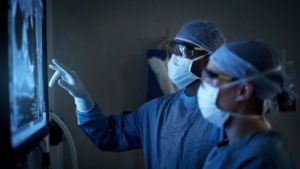
ATLANTA – Hospital intensive care units (ICUs) treat patients around the clock. But overnight shifts are hard to fill and can lead to burnout.
“Not only is it hard on the body to work at night, but it’s hard at 3 in the morning to decide if this problem is enough of a problem to call a physician,” said Katie Casey, an ICU nurse practitioner at Emory Saint Joseph’s Hospital in the Atlanta suburb of Sandy Springs.
Emory Healthcare is tackling the problem by sending teams of doctors and nurses to deliver telemedicine from the other side of the world.
“I get more phone calls now without feeling bad that they’re waking somebody up in the middle of the night,” said Dr. Milad Sharifpour.
Sharifpour and his colleagues travel to Australia on tourist visas and stay no more than 90 days at a time. They monitor and communicate with patients over a closed network to insure privacy.
“By sending our staff to Australia, they have better sleep patterns,” said Dr. Timothy Buchman, director of the Emory Critical Care Center. “They’re better rested. They make decisions more efficiently, more quickly and more reliably.”
Multiple studies suggest the introduction of telemedicine to ICUs can reduce medical costs while improving patient outcomes. Emory’s Electronic ICU (eICU) program saved $4.6 million in Medicare spending over 15 months while shortening the length of hospital stays and reducing readmissions, according to an independent audit by Abt Associates for the Centers for Medicare & Medicaid Services (CMS).
In addition to providing expert consultation to overnight staff, eICUs allow patients’ spouses and relatives to talk to specialists during off hours.
“Most families don’t converge in the hospital at 10 or 11 a.m. when the physician is there,” said Cheryl Hiddleson, director of the Emory eICU Center. “They come when they get off work. It may be 8, 9, 10 at night.”
Doctors and nurses say patients and families appreciate the extra care overnight and quickly get used to speaking to someone on a video monitor.
“It’s not as personal, obviously, because you’re not right at the bedside,” said eICU nurse Terri Reece, speaking from Australia by video conference. “But it’s a different relationship. It’s more of a supportive role. And the patients have been… very receptive, glad to see someone. It’s more of a talking relationship. But they’re very receptive.”
Fox News Producer David Lewkowict contributed to this report.


